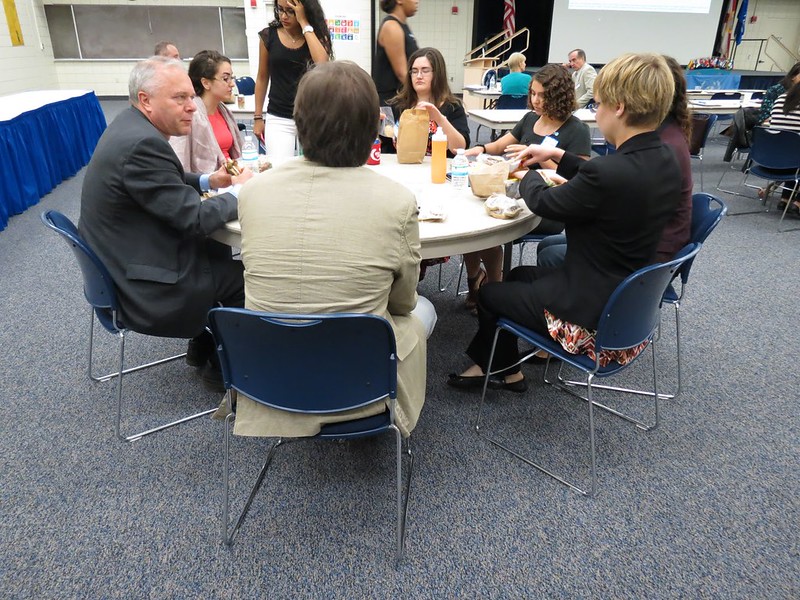
The International Career Development Seminar, an all-day workshop open to the entire Sarasota community, annually hosts numerous speakers to discuss work opportunities abroad. In celebration of United Nations (UN) Day and the organization’s 70th anniversary, the seminar was held last Saturday, Oct. 24 in Sudakoff for the sixth year in a row.
The seminar is a joint effort between New College’s International Studies Program and the UNA-USA Sarasota-Manatee chapter.
“Our goal is to strengthen the interest and participation of Americans in International Affairs and the global community more generally,” the seminar’s program read.
Former president of the United Nations Association of the United States of America (UNA-USA) Sarasota-Manatee Chapter Dorothy Watson opened the seminar with a presentation about her experience moving from New York to Florida and helping found the Sarasota-Manatee Chapter of the UNA-USA. Following Watson, Professor of Political Science and Director of the International Studies program Barbara Hicks introduced a UN video that ascertained “we can be the first generation to end extreme poverty,” displaying the organization’s newly introduced global goals focused on sustainable development.
“Take the baton,” Hicks said. “Make the world you want to live in.”
Provost Steve Miles represented the higher education institutions in the Sarasota-Manatee area – New College, Ringling College of Art and Design, State College of Florida, and University of South Florida Sarasota-Manatee – with his welcome address. Miles emphasized the growing collaboration and connection between the institutions, calling the cohort the “consortium.”
“The institutions in this area all get along really well. We bring so many resources together,” Miles said. “When we work together, the possibilities are really amazing.” He also mentioned that the schools are plotting a cross registration opportunity, citing students who are already taking advantage of the preliminary program.
“You’re here because you want to change the world,” Miles said looking out at the audience.
The first speaker, Robin Grolle – who works in U.S. and international college counseling, began the seminar with an insightful and fitting speech about how the following speakers were able to accomplish the goals they did in their lives. She specifically mentioned stepping out of comfort zones, leaving familiarity – family, friends, old schools – to find open doors, take opportunities, and lead remarkable lives. She, like many of the other speakers, strongly suggested taking as many foreign language classes as possible and considering study abroad. For international studies students, Groelle recommended looking at Tufts University, Georgetown University, and Johns Hopkins University’s programs to mirror.
Returning for his sixth year, chief of outreach at the UN Office of Resources Management, John Ericson, covered the logistics of working at the organization using his 33 years of UN experience. Associate Professor of Political Science and Environmental Studies Frank Alcock spoke in the context of climate change and environmental protection about what skill sets to acquire for a successful international career.
“The ability to speak a second or third language is really empowering and enabling,” Alcock said. Other skills Alcock touched on were writing and communication, critical and analytical thinking, and data literacy.
“Your ability to be quantitatively literate,” Alcock said. “That’s a very attractive skill set.”
Sehee Chung represented the U.S. Peace Corps, speaking on her formative experience in the program, which, she said, is a great stepping-stone for another international career. She also emphasized internships and work-study positions in high school and college and encouraged seizing opportunities as they arise.
“I see a group of people capable of making change in the world,” social entrepreneur and human rights and social justice fellow Brock Leach said to the audience. He spoke about the unique position of a social entrepreneur, which entails an inquisitive creative spirit, clear intention and persistence, empathy, and radical collaboration.
U.S. Foreign Service Department of State Diplomat-in-Residence Catherine Rodriguez discussed her unique career history and how the important opportunities she sought out and took shaped her life in the best way possible. The three qualities she collected to describe someone ready for an international career were persistence, determination and moxie. Rodriguez emphasized that the personal statement – used when applying for internships – is many times the make or break piece that can propel a student to success or drop them out of the running for anything. Using those three aforementioned qualities, Rodriguez told students to be different and hone in on a personal story even if it sounds “corny” in those statements.
Assistant Professor of Economics Tracy Collins highlighted the importance of networking, work experience, and starting early.
“Sell yourself in a positive way, not a negative arrogant way,” Collins said. “If you say you’ve never failed, you won’t get the job because it’s a lie.”
“They just like people who are well-rounded,” Collins added.
Chief Development Strategist at the United States Agency for International Development (USAID) Raymond Morton ended the series of speakers with a speech about his life in the foreign service. Afterwards, break-out sessions were held where students were able to go and ask the speakers more questions in a smaller environment. A reception was the last item on the agenda, allowing students one-on-one communication with the speakers as a practice of networking.
